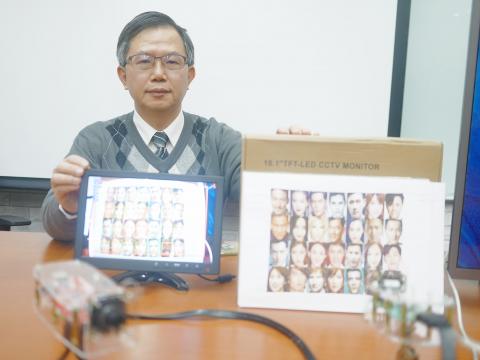A team of Taiwanese researchers and a tech firm yesterday unveiled what they said was the world’s smallest artificial intelligence (AI) chip, which measures 7mm by 7mm.
The “edge AI chip” was developed by National Taiwan Normal University’s (NTNU) Department of Electrical Engineering in collaboration with the Taiwan branch of T1 Technologies Inc.
They also unveiled a system development kit (SDK), which is a collection of software used for developing applications for a specific device or operating system.

Photo courtesy of National Taiwan Normal University
Within the emerging concept of edge computing, “the edge” is a theoretical space where a physically distant data center resource can be accessed.
The AI chip incorporates a deep-learning convolutional network and can be used in many applications, the team said.
In the booming AI industry, most products available typically incorporate computer programs and display cards.
However, the edge AI chip can be built into mainboards and used in various applications, said professor Wang Wei-yen (王偉彥), one of the team members.
The edge AI chip can transform some devices into a smart digital assistant by carrying out AI identification and sending the result to a matching master control chip, he said.
This is where the SDK comes in, as it is used for subsequent processing and verification, Wang said.
The team said it believes that with such an innovation, product development cycles could be shortened, saving money, time and manpower, and simultaneously transforming many regular audio and video devices into AI products.

Alain Robert, known as the "French Spider-Man," praised Alex Honnold as exceptionally well-prepared after the US climber completed a free solo ascent of Taipei 101 yesterday. Robert said Honnold's ascent of the 508m-tall skyscraper in just more than one-and-a-half hours without using safety ropes or equipment was a remarkable achievement. "This is my life," he said in an interview conducted in French, adding that he liked the feeling of being "on the edge of danger." The 63-year-old Frenchman climbed Taipei 101 using ropes in December 2004, taking about four hours to reach the top. On a one-to-10 scale of difficulty, Robert said Taipei 101

A preclearance service to facilitate entry for people traveling to select airports in Japan would be available from Thursday next week to Feb. 25 at Taiwan Taoyuan International Airport, Taoyuan International Airport Corp (TIAC) said on Tuesday. The service was first made available to Taiwanese travelers throughout the winter vacation of 2024 and during the Lunar New Year holiday. In addition to flights to the Japanese cities of Hakodate, Asahikawa, Akita, Sendai, Niigata, Okayama, Takamatsu, Kumamoto and Kagoshima, the service would be available to travelers to Kobe and Oita. The service can be accessed by passengers of 15 flight routes operated by

Taiwanese and US defense groups are collaborating to introduce deployable, semi-autonomous manufacturing systems for drones and components in a boost to the nation’s supply chain resilience. Taiwan’s G-Tech Optroelectronics Corp subsidiary GTOC and the US’ Aerkomm Inc on Friday announced an agreement with fellow US-based Firestorm Lab to adopt the latter’s xCell, a technology featuring 3D printers fitted in 6.1m container units. The systems enable aerial platforms and parts to be produced in high volumes from dispersed nodes capable of rapid redeployment, to minimize the risk of enemy strikes and to meet field requirements, they said. Firestorm chief technology officer Ian Muceus said

MORE FALL: An investigation into one of Xi’s key cronies, part of a broader ‘anti-corruption’ drive, indicates that he might have a deep distrust in the military, an expert said China’s latest military purge underscores systemic risks in its shift from collective leadership to sole rule under Chinese President Xi Jinping (習近平), and could disrupt its chain of command and military capabilities, a national security official said yesterday. If decisionmaking within the Chinese Communist Party has become “irrational” under one-man rule, the Taiwan Strait and the regional situation must be approached with extreme caution, given unforeseen risks, they added. The anonymous official made the remarks as China’s Central Military Commission Vice Chairman Zhang Youxia (張又俠) and Joint Staff Department Chief of Staff Liu Zhenli (劉振立) were reportedly being investigated for suspected “serious